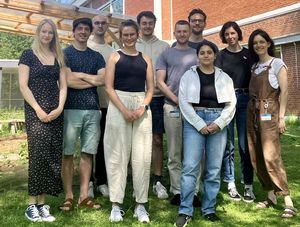OSIG - Short interview
Today we are talking about Open Science - a topic that is becoming increasingly important and the subject of much discussion. How did you come to this topic?
The Open Science Interest Group (OSIG) was developed through observing and participating in the growing discussions about the reproducibility crisis[1] across science, including neuropsychology and neuroimaging. Seeing how teams of researchers were coming together to address these challenges inspired us to explore how we, as a team of volunteers who are passionate about open and transparent research, could support the students and staff of the department to overcome these challenges in their own work.
What is behind your initiative ? To what extent does your initiative support the topic of Open Science?
Our initiative is driven by a desire to support the culture of transparency and collaboration within the research community at our university. We aim to address key issues in open science, such as reproducibility, accessibility, and sharing resources. We do this by actively supporting members of the department to implement the core principles of open science, such as preregistration, open data, materials and code, reproducible workflows and the use of open access platforms.
What (scientific) aspirations do you personally associate with Open Science? How does this manifest itself in your daily work?
We aim to support our department in implementing these core principles of open science in their own work, and to integrate current open science practices into the study programme curriculum. To achieve this, we hold fortnightly meetings, oversee a variety of projects, and encourage commitment to research transparency. Examples of our projects include an open science seminar series, workshop organisation for coding and preregistrations, liaising with teaching staff, and ongoing knowledge collection and sharing. We hope that we contribute meaningfully to making research more transparent and reproducible across the department.
What would an ideal Open Science world look like for you?
To us, an ideal open science world would implement open science knowledge and practices early in academic education, so that open science becomes standard practice in future careers rather than something special.
Finally, what advice do you have for Open Science newcomers?
Firstly, don’t avoid it. There is a lot of support available in different forms. Secondly, you can alleviate feelings of being overwhelmed or stressed by being open about your struggles. There is a very supportive open science community inside and outside of UOL. You don’t have to get everything right, mistakes are okay. You’re not alone in being new to navigating open science. The important thing is to be transparent and to learn. You will get there.
[1] The Open Science movement is often discussed in the context of the reproducibility crisis and the replicability crisis. This includes the realisation and the associated change in academic culture and mindset that a large proportion of scientific studies published in various disciplines are neither replicable nor reproducible. A study is considered reproducible if the same result can be achieved with the same data and methods. Replicability, on the other hand, means that the same result can be achieved with the same methods on different data or with different methods on the same data.




